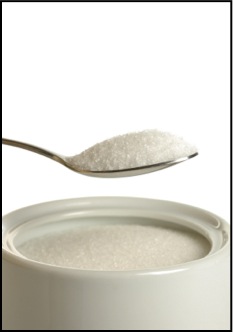Immune System Zappers
 Sugar and other simple carbohydrates reduce white-blood-cell activity. One tablespoon of sugar in any form – white sugar, honey, or even fruit juice – results in a 50 percent reduction for up to five hours. There are four classes of simple sugars: sucrose (table sugar), fructose (fruit sugar), honey, and malts.
Sugar and other simple carbohydrates reduce white-blood-cell activity. One tablespoon of sugar in any form – white sugar, honey, or even fruit juice – results in a 50 percent reduction for up to five hours. There are four classes of simple sugars: sucrose (table sugar), fructose (fruit sugar), honey, and malts.
Drinking fruit juice is like mainlining sugar; it’s too much sugar at one time. Think about it this way: you’d have a hard time eating ten apples, but you could easily drink a glass of apple juice, which may contain the sugar of up to 10 juiced apples. If fruit juice were marketed honestly, they would say, “All the sugar, none of the fiber!” Help yourself, however, to all the whole fruits you want.
Too much sugar – whether it’s juice, honey, maple syrup, evaporated cane juice, brown sugar, fructose, or white table sugar – is never a healthy choice. Sugar depletes the body of B vitamins, calcium, and magnesium. One tablespoon of sugar in any form results in a 50 percent reduction in white-blood-cell activity for up to five hours. Hope a nasty virus doesn’t travel your way during that time! Sugar lowers our immune function! Unfortunately, the average American consumes over 150 oz. of sugar a day. A can of Coke has 9-10 teaspoons, which is at least three tablespoons!
Occasional, moderate use is fine. But too much sugar has a number of other extremely damaging effects on the human body:
- it can suppress the immune system,
- contribute to mood disorders, including hyperactivity, anxiety, depression, and concentration difficulties – especially in children,
- produce a significant rise in triglycerides,
- cause drowsiness and decreased activity in children,
- cause symptoms associated with ADHD, especially in children,
- cause hypoglycemia (low blood sugar),
- increase the risk of coronary heart disease,
- lead to chromium deficiency
- cause copper deficiency,
- upset the body’s mineral balance,
- promote tooth decay,
- raise adrenaline levels in children,
- lead to periodontal disease,
- speed the aging process, causing wrinkles and gray hair,
- increase total cholesterol, increase systolic blood pressure, reduce helpful high-density cholesterol (HDLs), promote an elevation of harmful cholesterol (LDLs),
- contribute to weight gain and obesity,
- contribute to existing diabetes, osteoporosis, or kidney damage,
- cause free-radical formation in the bloodstream,
- cause atherosclerosis,
- cause depression,
- increase the body’s fluid retention,
- cause hormonal imbalance,
- interfere with absorption of calcium and magnesium
- and increase the risk of Crohn’s disease and ulcerative colitis
OK, I think I made my point. An occasional sweet treat is acceptable and even encouraged. Moderation is the key. There’s no reason to totally abstain from sugar unless you’re fighting off an infection, have yeast overgrowth, or are battling diabetes. Just go easy.
Other Fast Facts About Your Health …
 Food allergies cause the immune system to “ramp-up” and become over stimulated, and chronic immune challenges from food allergies may overwhelm secretory IgA reserves. Research has shown that allergic foods can cause a 50 percent drop in a person’s white-blood-cell count. Daily intake of allergic foods can inflame intestinal cells, causing white blood cells to die and then release digestive enzymes into the surrounding tissue. When these enzymes damage the normally impermeable intestinal lining, the result is intestinal permeability. Intestinal permeability can trigger autoimmune reactions. These reactions can start a cascade of unwanted consequences including inflammation, infection, and pain.Alcohol can reduce the amount and activity of white blood cells.
Food allergies cause the immune system to “ramp-up” and become over stimulated, and chronic immune challenges from food allergies may overwhelm secretory IgA reserves. Research has shown that allergic foods can cause a 50 percent drop in a person’s white-blood-cell count. Daily intake of allergic foods can inflame intestinal cells, causing white blood cells to die and then release digestive enzymes into the surrounding tissue. When these enzymes damage the normally impermeable intestinal lining, the result is intestinal permeability. Intestinal permeability can trigger autoimmune reactions. These reactions can start a cascade of unwanted consequences including inflammation, infection, and pain.Alcohol can reduce the amount and activity of white blood cells.
Hypothyroidism can reduce the speed and effectiveness of enzymes associated with supporting immune functions. Adrenal dysfunction causes lowered resistance to all forms of stress and leads to lowered immune resistance.
Chronic stress eventually leads to adrenal exhaustion.
Being overweight causes a reduction in bacteria-killing white blood cells. Heavy metals, including cadmium, lead, and mercury, inhibit the formation of antibodies and reduce the bacteria-killing ability of white blood cells. Pesticides and other environmental toxins can overwhelm the immune system and its supporting cast (liver, kidneys, etc.). Pesticides depress T- and B-cells and place a drain on the lymph system, especially the thymus gland. Drugs, including acetaminophen, aspirin, ibuprofen, and corticosteroids, decrease antibody production.
Inadequate rest suppresses natural killer cell activity. Candida overgrowth may allow toxins to be released directly into the body. These toxins cause the immune system to become overwhelmed and can initiate a host of immune-disrupting symptoms. Severe trauma, including accidents, surgeries, and burns, are extremely stressful to the body as a whole. Traumas can cause vitamin, mineral, and other essential nutrients to become deficient. Any inflammatory responses from the trauma can also overload the immune system.
Chronic antibiotic use can increase overgrowth of Candida, making bacteria more resistant to immune-system attacks.
Learn More About Our Food Allergy Test Kit
Patients Want to be Informed
Liana Fraenkel, M.D., M.P.H., from the Yale University School of Medicine, and Ellen Peters, Ph.D., from Decision Research, conducted a focus group of 216 people that evaluated how patients arrive at medical decisions. What researchers found was that when given choices, participants tended to be more wary of the negative side effects associated with a proposed risky treatment. Participants’ willingness to accept treatment was greatly reduced when given the opportunity to be included in making the decision. Researchers who conducted the study had the goal in mind to highlight the importance of patient involvement in the decision-making process.
 Rather than doctors simply prescribing a potentially dangerous therapy with no questions asked, patients should be encouraged to participate in making these important medical decisions. Dr. Fraenkel believes that in doing so; the number of risky procedures undertaken will be greatly reduced. Make your doctor take the time to explain the potential advantages and side effects of the therapies he or she recommends. Do you have to take this drug or can you wait? Are there alternatives? Your doctor may not know, but a Google search and half an hour of research can yield all the information you need to make an informed decision. Always look prescription drugs up at www.MayoClinic.com to see what potential side effects are associated with them. Become an informed consumer and don’t hesitate to fire your doctor if they don’t make time to explain their recommended therapy – the pros and cons.
Rather than doctors simply prescribing a potentially dangerous therapy with no questions asked, patients should be encouraged to participate in making these important medical decisions. Dr. Fraenkel believes that in doing so; the number of risky procedures undertaken will be greatly reduced. Make your doctor take the time to explain the potential advantages and side effects of the therapies he or she recommends. Do you have to take this drug or can you wait? Are there alternatives? Your doctor may not know, but a Google search and half an hour of research can yield all the information you need to make an informed decision. Always look prescription drugs up at www.MayoClinic.com to see what potential side effects are associated with them. Become an informed consumer and don’t hesitate to fire your doctor if they don’t make time to explain their recommended therapy – the pros and cons.
One of the most pervasive myths in the American culture today is that we are entitled to a great life – that somehow, somewhere, someone (certainly not us) is responsible for filling our lives with continual happiness, exciting career options, nurturing family time, and blissful personal relationships simply because we exist. But the one real truth – and one lesson this whole book is based on – is that there is only one person responsible for the quality of the life you live. That person is you.
From Jack Canfield’s (author of Chicken Soup for the Soul) book, The Success Principles.
Protocol For Chronic Sinusitis
 Chronic sinus infections may be the result of bacterial or fungal infections. Sinus infections are usually treated with antibiotics and steroids. However, antibiotics will only make fungal sinus infections worse. I’ve found that many of my patients find relief from chronic nasal congestion and infections from using the following protocol.
Chronic sinus infections may be the result of bacterial or fungal infections. Sinus infections are usually treated with antibiotics and steroids. However, antibiotics will only make fungal sinus infections worse. I’ve found that many of my patients find relief from chronic nasal congestion and infections from using the following protocol.
If you have chronic sinus infections you should be using a daily nasal rinse program. I use a nasal rinse kit from Neil Med Products -available by calling Neil Med directly (1-877-477-8633). Patients simply add warm water and one of the (50 to a box) buffered sodium packets into the plastic six ounce bottle. For stubborn infections, I encourage patients to add several drops of liquid betadine. Betadine is a topical antiseptic; it kills viruses, bacteria, and yeast.
Make Your Own Nasal RinseMix together the following:
• __ teaspoon of betadine
• __ teaspoon of baking soda
• __ teaspoon of liquid glycerin
• __ 15–20 ounces warm water
Draw up into a baby bulb syringe, and flush each nostril several times. Don’t inhale through your nose. Just let mixture rest in your nose for a few seconds and then gently blow nostril clean. Note: Betadine will stain your clothes, so be sure to cover your upper body a with towel, etc. Use once a day for 2 weeks, then as needed at first sign of cold, flu, or sinusitis.
Many of my patients with chronic sinusitis find dramatic relief getting rid of dairy products form their diet, and also once they correct an unsuspected low thyroid. If you’d like to know more about our office or protocols please feel free to give us a call (M-Th, 8-4 PM CST) Toll free 1-888-884-9577.
